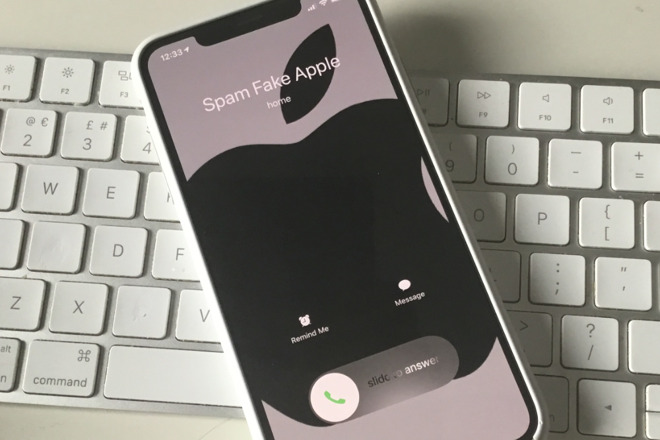FTC warns of new Apple support call scam
Scammers are once again using the biggest names in tech to pry personal information from unsuspecting consumers, with the latest gambit involving fake calls from Apple support.

Flagged by the U.S. Federal Trade Commission on Thursday, scammers are invoking robocalling techniques to glean credit card numbers, account passwords and other sensitive data from Apple and Amazon customers.
The scamming effort is detailed in a blog post that warns consumers of suspicious calls claiming to be from Apple or Amazon support services. Both ask users to follow prompts that ultimately divulge personal information.
In the case of Apple, call recipients are informed of supposedly suspicious iCloud account activity or an outright breach. Fake calls from Amazon are similarly worded, claiming a user's account shows suspicious purchase activity, a lost package, or problems with a recent order, the FTC says.
Robocalls are forwarded to "customer support" personnel with user interaction. Alternatively, victims are instructed to dial a support center phone number, likely a contingency for phishing calls sent to voicemail.
The FTC tells consumers to disregard the instructions. If Apple or Amazon account holders believe there is a problem with their account, they should attempt to make contact using only legitimate phone numbers or websites that can be independently verified.
With its large -- and typically well-heeled -- customer base, Apple is a preferred target for scammers. Early last year, for example, a particularly sneaky phishing operation involved robocalls that appeared to originate from AppleCare's 1-800-MY-APPLE number.

Flagged by the U.S. Federal Trade Commission on Thursday, scammers are invoking robocalling techniques to glean credit card numbers, account passwords and other sensitive data from Apple and Amazon customers.
The scamming effort is detailed in a blog post that warns consumers of suspicious calls claiming to be from Apple or Amazon support services. Both ask users to follow prompts that ultimately divulge personal information.
In the case of Apple, call recipients are informed of supposedly suspicious iCloud account activity or an outright breach. Fake calls from Amazon are similarly worded, claiming a user's account shows suspicious purchase activity, a lost package, or problems with a recent order, the FTC says.
Robocalls are forwarded to "customer support" personnel with user interaction. Alternatively, victims are instructed to dial a support center phone number, likely a contingency for phishing calls sent to voicemail.
The FTC tells consumers to disregard the instructions. If Apple or Amazon account holders believe there is a problem with their account, they should attempt to make contact using only legitimate phone numbers or websites that can be independently verified.
With its large -- and typically well-heeled -- customer base, Apple is a preferred target for scammers. Early last year, for example, a particularly sneaky phishing operation involved robocalls that appeared to originate from AppleCare's 1-800-MY-APPLE number.

Comments
The Apple one was pretty much as described here (my iCloud account is locked due to suspicious activity), but in the Amazon one it was a "Thank you for your order of an Apple iPhone in the amount of $997, scheduled to ship tomorrow. If this order is correct you need to do nothing, your credit card is being charged prior to shipment. If the order was placed in error please press one to be connected to an Amazon customer service representative"
I haven't received any scam phone calls regarding my Apple iCloud account.
If anyone calls “from Apple” I’ll just say that I prefer peaches.
https://www.vice.com/en/article/d3b7na/the-story-of-lenny-the-internets-favorite-telemarketing-troll
The act of warning us is a demonstration of how nothing at all is done about the problem. It takes actual regulation to make shit like this stop and our governments (both parties) have been utterly unmotivated to do what it takes to stop this insanity. Phones are virtually useless for voice communication because of scammers and advertising.
DO SOMETHING ABOUT IT.
If everyone's phone did that it would go a long way towards discouraging these types of calls. No organization wants to waste time and money trying to scam call us if no one answers.